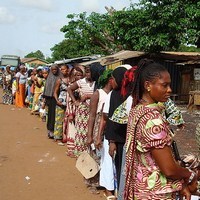CONAKRY, Guinea — Guineans at home and abroad finally went to the polls on Sept. 28 to elect 114 members of parliament. Despite multiple delays and a series of demands from the opposition for fair political competition, preliminiary results suggest that President Alpha Conde’s ruling Rally of the Guinean People (RPG) party won a relative majority, thus solidifying the gains made during Conde’s first three years in power and further intensifying the rivalry between the country’s different political factions. However, the opposition Union of Democratic Forces of Guinea (UFDG) coalition has disputed the early results and withdrawn from the vote-counting process in protest. So while Guinea’s transition is now officially over, much remains to be done in terms of political dialogue ahead of the 2015 presidential ballot.
Delayed multiple times since 2007, the elections carried abnormally high stakes. The current legislative body, the National Transitional Council (CNT), was established in 2010 as part of the Ouagadougou Accords, which brought an end to the period of military rule ushered in by the coup that followed former President Lansana Conte’s death in December 2008. The council enjoyed the same prerogatives as an elected parliament, and was the last remaining transitional body. Thus, its dissolution will both symbolize and formalize the end of a troubled political transition while simultaneously completing the slow shift to a full but fragile democracy.
The Ouagadougou Accords stipulated that legislative elections were to take place six months after Conde’s inauguration in December 2010. However, the political dialogue between the RPG and UFDG coalition under Cellou Dallein Diallo was marred by rumors, suspicions, conspiracy theories and ethnic tensions, preventing any constructive debate that would generate a consensus around important issues.An agreement signed in July in Conakry was a decisive turning point in the holding of the long-overdue legislative elections. The document addressed many of the opposition’s major grievances, paving the way for the ballot to be scheduled. However, the UFDG continued to threaten a boycott until just days before the voting, and its withdrawal from the vote-counting process now underscores the challenges that remain in moving political contestation from the streets to the new parliament.

